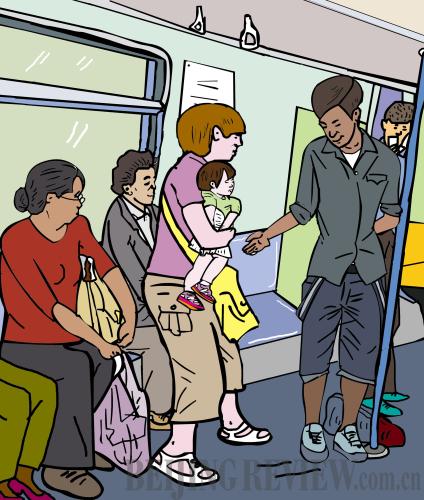|
 |
|
(LI SHIGONG) |
It was reported that in Hangzhou, east China's Zhejiang Province, a youth was recently slapped in the face repeatedly when he refused to give up his seat for a young couple holding a baby. And in Ji'nan, east China's Shandong Province, a mother slapped a man on the bus after nobody offered their seat to her 3-year-old child. These incidents are raising questions about bus and subway customs, an unspoken social etiquette in China determining who will sit and who will stand. Offering seats to those in need, such as seniors, pregnant women or people with babies, has been a traditional virtue of Chinese, but now it seems some passengers are rebelling against the "rules" of riding, and questioning why the tickets they bought do not entitle them to seating privileges. This phenomenon has also aroused debate among the public. The following are excerpts of some opinions.
Wang Wuzhong (paper.dzwww.com): Offering your seat to those in need on the bus is a social virtue. The old, the weak, the ill and the pregnant need more care, so the whole society should give them special consideration. Even in the animal world, there are cases of the strong helping the weak. On buses or subways, the weaker group is clearly defined. We need to offer a helping hand to those less able than ourselves when we are comparatively strong.
However, giving up one's seat is ultimately a moral issue, not a legal obligation. There are two codes to standardize human behaviors: one is morality and the other is the law. The maintenance of moral standards depends on self-discipline and public opinion, not violence or coercion.
Even when encountering a thief, it is better to solve the dispute through legal means than to get involved in a personal brawl. Overreacting to an affront of one's rights and interests could lead to violating the law and worsening matters. Like any other case, the bus seat issue should be dealt with rationally, rather than through violence.
Yuaner (youth.cn): Every passenger has to buy a ticket to ride the bus. Thus, all passengers share the same obligation and rights on board. No laws have stipulated that a certain passenger must offer his or her seat to someone else and no one should force someone else to offer you their seats. Offering your seat to the weak or the elderly is a virtue that we hope will be further promoted, but it is by no means a compulsory social moral code.
Chinese laws do not stipulate that the young must offer seats to those in need. Since this is not an obligation, if anyone has offered his or her seat to others, they should be praised and thanked by those receiving the seat. More importantly, since this is not a requirement, each passenger has the right to decide whether to offer the seat or not. Thus, no one has the right to criticize or denounce others for not following the custom.
It is virtuous to offer one's own seat to others, but declining to do so is not a sign of moral regression. It is merely one's right to decide whether or not to do the act of kindness. The Chinese tend to see such moral issues in black and white. The seat-offering debate is no exception. Some even point to the bus seat controversy as a sign of social indifference and moral decay.
On buses there are special seats for the elderly, the pregnant, the sick and the disabled. In normal circumstances, healthy young people are expected to stand while the less fit can sit. But whereas old, seriously disabled and pregnant people can be easily identified, it's not easy to tell who is ill and who is lightly disabled. For example, the young man who was slapped on the bus in Hangzhou had an injured leg that was not obviously seen.
Young people also have the right to safeguard their seats if they feel uncomfortable. In Taiwan's subways, young people can apply for a tag when they feel uncomfortable, which will give them the right to sit on special seats for those in need.
Morality demands that people regulate their own behavior, but not that of others. People differ from each other in their viewpoints, of course. If they think someone's moral standard is lower than their own, they should be alert, but are not supposed to take violent actions. Sadly, in reality, people tend to demand high moral standards from others while failing to hold themselves to the same standards.
Slapping the youth for not offering his seat does not defend morality; instead, it delivers a blow to morality in itself. The moral code should not be abused to police others, but should be a goal to improve oneself.
Not offering seats to others will not lead to moral degradation. People should learn to respect others' freedom and right to not give up their seats, and then the virtue of offering seats will naturally follow. Those who force others to do so are using morality to cover their private impulses and greed.
| 